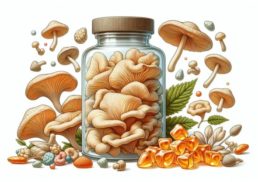Did you know that a traditional Japanese food called natto, made from fermented soybeans, might hold the key to better cardiovascular health? Enter nattokinase, a powerful enzyme derived from natto, which has gained attention for its potential health benefits in recent years. In this blog post, we’ll dive into the fascinating world of nattokinase, discover its origins and properties, and explore how it may help improve heart health and circulation.
From its potential to regulate blood pressure to its possible role in cholesterol management, nattokinase offers a wide range of benefits for maintaining a healthy heart. Join us as we uncover the secrets behind this remarkable enzyme and learn how you can harness its power for better cardiovascular health.
Table of Contents
Key Takeaways
Nattokinase is a fibrinolytic enzyme derived from natto with potential health benefits such as reducing the risk of heart disease and stroke, lowering high blood pressure, and decreasing cholesterol levels.
It has been studied for its potential to support cardiovascular health by managing blood pressure, cholesterol levels, and preventing clot formation.
Individuals should consult their healthcare provider prior to taking nattokinase supplements due to risks associated with bleeding disorders or surgery, interactions with medications, overdosing concerns, storage guidelines, as well as alternative supplement options for heart health.
Understanding Nattokinase: Origins and Properties

Nattokinase is a powerful protein and a novel fibrinolytic enzyme that has been used to assist with cardiovascular and heart health by dissolving blood clots. It is derived from natto, a traditional Japanese food made from fermented soybeans. Nattokinase has potential health benefits, such as:
Reducing the risk of heart disease
Lowering high blood pressure
Decreasing high cholesterol levels
Preventing stroke
With a demonstrated safety profile and multiple beneficial cardiovascular effects, nattokinase has attracted significant interest from researchers and health enthusiasts alike.
The Role of Fermented Soybeans
Natto, also known as vegetable cheese, is a popular fermented soybean food in Japan. The primary source of nattokinase, vegetable cheese natto, is produced by the bacteria Bacillus subtilis natto during the fermentation of soybeans.
Nattokinase acts similarly to tissue plasminogen activator (TPA), a naturally occurring enzyme in the human body responsible for breaking down blood clots. In addition to its remarkable clot-dissolving properties, natto is also packed with essential nutrients, such as:
calcium
copper
iron
magnesium
potassium
vitamin C
zinc
These nutrients may contribute to reducing cardiovascular disease mortality through dietary supplementation.
Fibrinolytic Enzyme and Its Functions
As a novel fibrinolytic enzyme, nattokinase breaks down fibrin, a protein that plays a crucial role in the formation of blood clots. By doing so, nattokinase prevents blood clot formation, which in turn reduces blood viscosity and improves circulation, ultimately affecting red blood cell aggregation.
This unique property has been demonstrated in a chemically induced thrombosis model using a rat femoral artery and is believed to contribute to the enzyme’s potential cardiovascular advantages, such as decreasing the risk of heart attack, stroke, and other cardiovascular diseases.
Nattokinase and Cardiovascular Health

Nattokinase has been widely studied for its potential cardiovascular health benefits, including its ability to regulate blood pressure, manage cholesterol levels, and prevent blood clot formation. By targeting these key factors, nattokinase improves blood flow and could play an essential role in supporting overall cardiovascular health.
Next, we’ll examine specific ways nattokinase might contribute to a healthier heart and circulatory system.
Blood Pressure Regulation
One of the ways nattokinase may help promote cardiovascular health is by regulating blood pressure, contributing to maintaining a healthy blood pressure. It does so by inhibiting angiotensin-converting enzyme, which leads to a reduced risk of hypertension. This action also helps in reducing whole blood viscosity, which further contributes to healthy blood flow.
Research has indicated that nattokinase has a beneficial effect on blood pressure, with reductions in both systolic and diastolic levels observed. By improving blood flow and reducing blood pressure, nattokinase shows promise as a natural remedy for individuals at risk of hypertension.
Cholesterol Management
Another potential benefit of nattokinase lies in its ability to manage cholesterol levels. Studies suggest that nattokinase may diminish plaque accumulation and curtail the development of atherosclerosis, a condition characterized by the buildup of plaque in the arteries.
In addition, research has shown that nattokinase can lower total cholesterol, LDL-C (bad cholesterol), and triglycerides in individuals with hyperlipidemia.
Furthermore, combining nattokinase with red yeast rice has been found to be more effective in decreasing cholesterol levels, making it a promising dietary supplement for maintaining healthy cholesterol levels and supporting cardiovascular health.
Blood Clot Prevention
Perhaps one of the most notable benefits of nattokinase is its potential to prevent blood clots. As a fibrinolytic enzyme, nattokinase breaks up fibrin, which is responsible for blood clot formation. By preventing clot formation, nattokinase not only reduces the risk of thrombotic events, but also improves blood flow.
This unique property makes nattokinase a promising natural remedy for individuals at risk of blood clots and related cardiovascular complications.
Potential Side Effects and Risks of Nattokinase
While nattokinase brings potential health benefits, it’s also important to consider the potential side effects and risks. We’ll cover possible concerns, such as its potential to exacerbate bleeding disorders, increase surgical bleeding, and cause allergic reactions.
Being informed about these risks can help you make an educated decision about whether nattokinase is right for you.
Bleeding Disorders and Surgery
Individuals with bleeding disorders or upcoming surgeries should exercise caution when using nattokinase, as it may increase the risk of bleeding. Nattokinase’s blood-thinning properties can be particularly concerning for those who already have a predisposition to bleeding or are taking blood thinners.
If you have a bleeding disorder or are scheduled for surgery, it’s crucial to consult with your healthcare provider before using nattokinase to ensure that it’s safe for you to use and to avoid potential complications.
Allergic Reactions
Though rare, severe allergic reactions to nattokinase are possible and require immediate medical attention. Symptoms of an allergic reaction may include hives, difficulty breathing, and swelling of the face, lips, tongue, or throat.
If you suspect that you’re experiencing an allergic reaction to nattokinase, it’s important to discontinue use and seek medical assistance promptly. Be sure to inform your healthcare provider if you’re allergic to natto or fermented soybeans.
For more info, visit Nattokinase: Benefits, Side Effects, and Precautions
Nattokinase Interactions with Medications
In addition to the potential side effects and risks mentioned earlier, it’s essential to be aware of the possible interactions between nattokinase and certain medications, such as blood thinners and antihypertensive drugs.
In this section, we’ll discuss these potential interactions and the precautions you should take if you’re using these medications.
Blood Thinners
Caution is advised when taking nattokinase with blood thinners, as it may increase the risk of bleeding. Nattokinase’s ability to break up blood clots and thin the blood may worsen the bleeding and bruising side effects of blood thinners.
Therefore, it’s important to discuss your use of nattokinase with your healthcare provider if you’re taking blood thinners to ensure that you’re using both medications safely and effectively.
Antihypertensive Drugs
Nattokinase may enhance the effects of antihypertensive drugs, potentially leading to excessively low blood pressure. By reducing systolic and diastolic blood pressure, nattokinase may be beneficial in controlling blood pressure, but it’s essential to monitor its effects when taken with antihypertensive medications.
Consult with your healthcare provider to determine the appropriate course of action if you’re taking antihypertensive drugs and considering nattokinase as a supplement.
Dosage Recommendations and Guidelines
Nattokinase dosage recommendations vary, with adult dosages ranging from 2000-7000 fibrinolytic units daily. It’s important to consult a healthcare provider for specific guidance on the appropriate dosage for your individual needs, as they can provide personalized recommendations based on your medical history and current health status.
In this section, we’ll discuss general dosage guidelines for nattokinase and the importance of following your healthcare provider’s advice.
Adult Dosage
The suggested dosage for adults taking nattokinase is typically between 100 and 200 milligrams per day. However, it’s important to follow your healthcare provider’s recommendations for personalized dosing, as they can provide guidance on the optimal dosage for your particular needs.
Always inform healthcare providers and pharmacists of any changes in medication, including:
over-the-counter medications
herbal medications
natural medications
supplements
This is important to prevent potential interactions and side effects.
Overdose Concerns
Overdose concerns are limited due to a lack of toxicity information, but symptoms may resemble severe side effects. If you’re concerned about a potential overdose, it’s crucial to seek immediate medical attention.
Consuming an excessive amount of nattokinase may result in an increased risk of bleeding and complications in individuals predisposed to bleeding or taking medications for high blood pressure. Therefore, it’s important to consult with a healthcare professional before consuming high doses of nattokinase.
Nattokinase Supplements: Forms and Storage
Nattokinase supplements are available in various forms, including capsules, tablets, and powders. Regardless of the form you choose, proper storage and disposal are essential for maintaining the potency and safety of the supplement.
Let’s address the importance of proper storage and disposal practices for nattokinase supplements. For potency and safety, nattokinase supplements should be stored in a cool, dry place away from direct sunlight and moisture. Remember, always dispose of expired or unused nattokinase supplements as per local regulations and guidelines.
By following proper storage and disposal practices, you can ensure that your nattokinase supplements remain effective and safe to use.
Alternative Supplements for Heart Health
While nattokinase offers a range of potential health benefits, it’s not the only supplement that may support cardiovascular health. Alternative supplements, such as ginkgo, may also provide cardiovascular benefits, but should be used with caution and under the guidance of a healthcare provider. Ginkgo has been suggested to reduce inflammation, enhance blood circulation, and potentially reduce the likelihood of blood clots. However, just like nattokinase, ginkgo may interact with certain medications, such as blood thinners, and may increase the risk of bleeding for individuals with preexisting bleeding disorders.
By exploring alternative dietary supplements and discussing their potential benefits and risks with your healthcare provider, you can make an informed decision about which supplements are best suited to your individual needs and goals for maintaining a healthy heart.
Summary
In conclusion, nattokinase is a powerful enzyme derived from fermented soybeans that offers a range of potential health benefits for cardiovascular health and circulation. From regulating blood pressure and managing cholesterol levels to preventing blood clots, nattokinase shows promise as a natural remedy for better heart health. However, it’s essential to be aware of the potential side effects, risks, and interactions with medications when considering nattokinase supplementation.
Always consult with your healthcare provider before starting any new supplement regimen, and be mindful of proper dosage, storage, and disposal practices to ensure the safety and effectiveness of your supplements. By staying informed and making proactive choices for your heart health, you’re taking important steps toward a healthier, happier future.
Frequently Asked Questions
What is nattokinase good for?
Nattokinase is a bacterial enzyme produced from natto, a traditional Japanese food made from fermented soybeans. It has been shown to help prevent clot formation and reduce blood pressure.
It is not yet known if it can be used as a cancer treatment in humans.
Who should not take nattokinase?
Patients with a history of deep vein thrombosis, coagulation disorders, or who are taking an anticoagulant should not take nattokinase.
Is nattokinase safe to take daily?
Nattokinase is a commonly eaten food in Japan with a safe history of use for up to 3 years.
Therefore, it is likely safe to take nattokinase daily.
What to avoid when taking nattokinase?
Patients with a history of deep vein thrombosis should avoid using nattokinase, as it could interact with blood thinners and other drugs that reduce clotting, like aspirin and ibuprofen, leading to excess bleeding and bruising.
What are the potential health benefits of nattokinase?
Nattokinase may help support cardiovascular health by helping to regulate blood pressure, manage cholesterol levels, and prevent blood clot formation.









